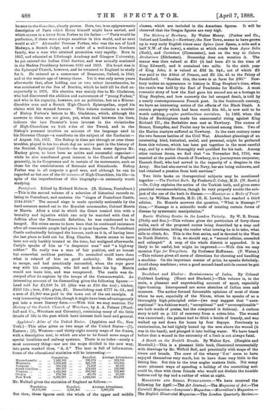Pontefract. Edited by Richard Holmes. (R. Holmes, Pontefract.) —This is
the second volume of a selection of historical records re- lating to Pontefract, and contains the "sieges of Pontefract Castle, 1644-1649." The second siege is made specially noticeable by the hard measure meted out to the Royalist commander, Colonel Morris or Marris. After a trial in which the Court treated him with a brutality and injustice which can only be matched with that of Jeffries after the Monmonth Rebellion, he was condemned to be hanged. His crime seems to have been that he continued resistance after all reasonable people had given it up as hopeless. To Pontefract Castle undoubtedly belonged the honour, such as it is, of having been the last place to hold out for King Charles. Marris seems to have been not only harshly treated at the time, but maligned afterwards. Carlyle speaks of him as "a desperate man" and "a highway robber." He really was a man of fair position, and an honest but somewhat reckless partisan. No scoundrel could have done what is related of him on good authority. He attempted to escape, and had practically succeeded, when the rope gave way with his companion, who fell and broke his leg. Marris would not leave him, and was recaptured. The castle was de- stroyed after its capture by the troops of the Commonwealth. An interesting account of its dismantling gives the following figures :— Lead sold for 21,610 7s. 2d. (this was at £10 the ton) ; timber, £243 12s.; iron, £40; glass, £1. Demolishing cost £777 4s. 6d., and a sum of £1,000 was paid to the town out of the net receipts. A very interesting volume this, though it might have been advantageously put into a more literary form.—With this we may mention The History of the Parish Church of Wrexham, by A. A. Palmer (Wood. hall and Co., Wrexham and Coventry), containing many of the little details of life in the past which have interest both local and general.


































 Previous page
Previous page